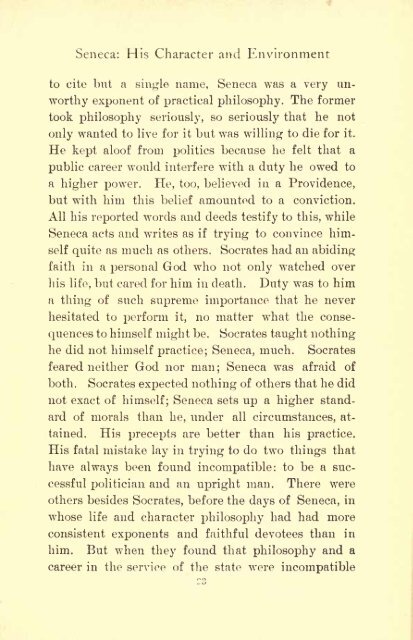Between Heathenism and Christianity - College of Stoic Philosophers
Between Heathenism and Christianity - College of Stoic Philosophers
Between Heathenism and Christianity - College of Stoic Philosophers
You also want an ePaper? Increase the reach of your titles
YUMPU automatically turns print PDFs into web optimized ePapers that Google loves.
Seneca: His Character <strong>and</strong> Environment<br />
to cite but a single name, Seneca was a very un<br />
worthy exponent <strong>of</strong> practical philosophy. The former<br />
took philosophy seriously, so seriously that he not<br />
only wanted to live for it but was willing to die for it.<br />
He kept alo<strong>of</strong> from politics because he felt that a<br />
public career would interfere with a duty he owed to<br />
a higher power. He, too, believed in a Providence,<br />
but with him this belief amounted to a conviction.<br />
All his reported words <strong>and</strong> deeds testify to this, while<br />
Seneca acts <strong>and</strong> writes as if trying to convince him<br />
self quite as much as others. Socrates had an abiding<br />
faith in a personal God who not only watched over<br />
his life, but cared for him in death. Duty was to him<br />
a thing <strong>of</strong> such supreme importance that he never<br />
hesitated to perform it, no matter what the conse<br />
quences to himself might be. Socrates taught nothing<br />
he did not himself practice; Seneca, much. Socrates<br />
feared neither God nor man; Seneca was afraid <strong>of</strong><br />
both. Socrates expected nothing <strong>of</strong> others that he did<br />
not exact <strong>of</strong> himself; Seneca sets up a higher st<strong>and</strong><br />
ard <strong>of</strong> morals than he, under all circumstances, at<br />
tained. His precepts are better than his practice.<br />
His fatal mistake lay in trying to do two things that<br />
have always been found incompatible: to be a suc<br />
cessful politician <strong>and</strong> an upright man. There were<br />
others besides Socrates, before the days <strong>of</strong> Seneca, in<br />
whose life <strong>and</strong> character philosophy had had more<br />
consistent exponents <strong>and</strong> faithful devotees than in<br />
him. But when they found that philosophy <strong>and</strong> a<br />
career in the service <strong>of</strong> the state were incompatible
















